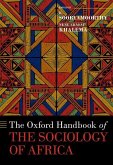The Oxford Handbook of Cognitive Sociology
Herausgeber: Brekhus, Wayne H; Ignatow, Gabe
The Oxford Handbook of Cognitive Sociology
Herausgeber: Brekhus, Wayne H; Ignatow, Gabe
- Gebundenes Buch
- Merkliste
- Auf die Merkliste
- Bewerten Bewerten
- Teilen
- Produkt teilen
- Produkterinnerung
- Produkterinnerung
The Oxford Handbook of Cognitive Sociology will serve as a resource for social researchers interested in how cognitive sociology can contribute to research within their substantive areas of focus, and for faculty and graduate students interested in cognitive sociology's main contributions and the central debates within the field. In particular, the volume includes a broad range of cognitive sociological perspectives as the classical sociological and newerinterdisciplinary approaches to cognition are often covered separately by scholars.
Andere Kunden interessierten sich auch für
![The Oxford Handbook of Program Design and Implementation Evaluation The Oxford Handbook of Program Design and Implementation Evaluation]() Anu RangarajanThe Oxford Handbook of Program Design and Implementation Evaluation198,99 €
Anu RangarajanThe Oxford Handbook of Program Design and Implementation Evaluation198,99 €![The Oxford Handbook of the Sociology of Latin America The Oxford Handbook of the Sociology of Latin America]() The Oxford Handbook of the Sociology of Latin America263,99 €
The Oxford Handbook of the Sociology of Latin America263,99 €![The Oxford Handbook of the Modern Slum The Oxford Handbook of the Modern Slum]() The Oxford Handbook of the Modern Slum198,99 €
The Oxford Handbook of the Modern Slum198,99 €![The Oxford Handbook of the Sociology of Africa The Oxford Handbook of the Sociology of Africa]() The Oxford Handbook of the Sociology of Africa198,99 €
The Oxford Handbook of the Sociology of Africa198,99 €![The Oxford Handbook of the Sociology of the Middle East The Oxford Handbook of the Sociology of the Middle East]() Armando SalvatoreThe Oxford Handbook of the Sociology of the Middle East267,99 €
Armando SalvatoreThe Oxford Handbook of the Sociology of the Middle East267,99 €![The Oxford Handbook of the Radical Right The Oxford Handbook of the Radical Right]() The Oxford Handbook of the Radical Right241,99 €
The Oxford Handbook of the Radical Right241,99 €![Oxford Handbook of Energy and Society Oxford Handbook of Energy and Society]() Oxford Handbook of Energy and Society194,99 €
Oxford Handbook of Energy and Society194,99 €-
-
-
The Oxford Handbook of Cognitive Sociology will serve as a resource for social researchers interested in how cognitive sociology can contribute to research within their substantive areas of focus, and for faculty and graduate students interested in cognitive sociology's main contributions and the central debates within the field. In particular, the volume includes a broad range of cognitive sociological perspectives as the classical sociological and newerinterdisciplinary approaches to cognition are often covered separately by scholars.
Hinweis: Dieser Artikel kann nur an eine deutsche Lieferadresse ausgeliefert werden.
Hinweis: Dieser Artikel kann nur an eine deutsche Lieferadresse ausgeliefert werden.
Produktdetails
- Produktdetails
- Verlag: Hurst & Co.
- Seitenzahl: 704
- Erscheinungstermin: 25. Juli 2019
- Englisch
- Abmessung: 251mm x 183mm x 51mm
- Gewicht: 1361g
- ISBN-13: 9780190273385
- ISBN-10: 0190273380
- Artikelnr.: 55348610
- Herstellerkennzeichnung
- Produktsicherheitsverantwortliche/r
- Europaallee 1
- 36244 Bad Hersfeld
- gpsr@libri.de
- Verlag: Hurst & Co.
- Seitenzahl: 704
- Erscheinungstermin: 25. Juli 2019
- Englisch
- Abmessung: 251mm x 183mm x 51mm
- Gewicht: 1361g
- ISBN-13: 9780190273385
- ISBN-10: 0190273380
- Artikelnr.: 55348610
- Herstellerkennzeichnung
- Produktsicherheitsverantwortliche/r
- Europaallee 1
- 36244 Bad Hersfeld
- gpsr@libri.de
Wayne H. Brekhus is Professor of Sociology at the University of Missouri. His research interests include the cultural sociology of cognition, the sociology of identities, social markedness and unmarkedness, and developing sociological theory. He is the author of Culture and Cognition: Patterns in the Social Construction of Reality; Peacocks, Chameleons, Centaurs: Gay Suburbia and the Grammar of Social Identity; and Sociologia dell'inavvertito (translated into Italian by Lorenzo Sabetta). He is currently writing a book on the sociology of identities. Gabe Ignatow is Professor of Sociology and Director of Graduate Studies at the University of North Texas. His research interests are mainly in the areas of sociological theory, cognitive social science and digital research methods, and his most recent books include An Introduction to Text Mining and Text Mining: A Guidebook for the Social Sciences, both coauthored with Rada Mihalcea.
* 1. Cognitive Sociology and the Cultural Mind: Debates, Directions,
and Challenges
* Wayne H. Brekhus and Gabe Ignatow
* Part I: Theoretical Foundations
* 2. Cognitive Sociology: Between the Personal and the Universal Mind
* Eviatar Zerubavel
* 3. Critical Theory and Cognitive Sociology
* Piet Strydom
* 4. Pierre Bourdieu as Cognitive Sociologist
* Omar Lizardo
* 5. Embodied Cognition: Sociology's Role in Bridging Mind, Brain, and
Body
* Karen A. Cerulo
* 6. The Old One-Two: Preserving Analytic Dualism in Cognitive
Sociology
* Stephen Vaisey and Margaret Frye
* 7. Can Carnal Sociology Bring Together Body and Soul, or, Who's
Afraid of Christian Wolff?
* John Levi Martin
* 8. Cognitive Sociology and French Psychological Sociology
* Gabe Ignatow
* 9. Cognitive Science and Social Theory
* David Eck and Stephen Turner
* 10. Dual Process Models in Sociology
* Vanina Leschziner
* 11. Bridging the Vocabularies of Dual-Process Models of Culture and
Cognition
* Jacob Strandell
* 12. Metaphorical Creativity-The Role of Context
* Zoltán Kövecses
* 13. Priming and Framing: Dimensions of Communication and Cognition
* John Sonnett
* Part II: Perspectives from Other Fields
* 14. Cognitive Linguistics
* Paul Chilton
* 15. Class, Cognition, and Cultural Change in Social Class
* Henri C. Santos, Igor Grossmann, and Michael E. W. Varnum
* 16. Cognitive Dichotomies, Learning Directions, and the Cognitive
Architecture
* Ron Sun
* 17. What is Cultural Fit? From Cognition to Behavior (and Back)
* Sanaz Mobasseri, Amir Goldberg, and Sameer B. Srivistava
* Part III: Methods of Cognitive Sociology
* 18. Productive Methods in the Study of Culture and Cognition
* Terence E. McDonnell and Kelcie L. Vercel
* 19. An Assessment of Methods for Measuring Automatic Cognition.
* Andrew Miles
* 20. Methods for Studying the Cultural Contextual Nature of Implicit
Cognition
* Hana Shepherd
* 21. Social Mindscapes and the Self: The Case for Social Pattern
Analysis
* Jamie L. Mullaney
* 22. Charting the Emergence of the Cultural from the Cognitive with
Agent-based Modeling
* Lynette Shaw
* Part IV: The Sociology of Perception and Attention
* 23. Sociology of Attention: Fundamental Reflections on a Theoretical
Program
* Markus Schroer
* 24. Risk, Culture, and Cognition
* Daina Cheyenne Harvey
* 25. Cultural Blind Spots and Blind Fields: Collective Forms of
Unawareness
* Asia Friedman
* Part V: Sociocultural Frames of Meaning, Metaphor, and Analogy
* 26. The Sacred, Profane, Pure, Impure, and Social Energization of
Culture
* Dmitry Kurakin
* 27. Cognition and Social Meaning in Economic Sociology
* Nina Bandelj and Christoffer Zoeller
* 28. Scientific Analogies and Hierarchical Thinking: Lessons from the
Hive?
* Diane M. Rodgers
* 29. Getting a Foot in the Door: Symbolism, Door Metaphors, and the
Cognitive Sociology of Access
* Stephanie Peña-Alves
* Part VI: Categories, Boundaries, and Identities
* 30. Foregrounding and Backgrounding: The Logic and Mechanics of
Semiotic Subversion
* Eviatar Zerubavel
* 31. War Widows and Welfare Queens: The Semiotics of Deservingness in
the U.S. Welfare System
* Brittany Pearl Battle
* 32. Perceiving and Enacting Authentic Identities
* J. Patrick Williams
* 33. Cognitive Migrations: A Cultural and Cognitive Sociology of
Personal Transformation
* Thomas DeGloma and Erin F. Johnston
* Part VII: Time and Memory
* 34. The Experience of Time in Organizations
* Benjamin H. Snyder
* 35. Silence and Collective Memory
* Vered Vinitzky-Seroussi and Chana Teeger
and Challenges
* Wayne H. Brekhus and Gabe Ignatow
* Part I: Theoretical Foundations
* 2. Cognitive Sociology: Between the Personal and the Universal Mind
* Eviatar Zerubavel
* 3. Critical Theory and Cognitive Sociology
* Piet Strydom
* 4. Pierre Bourdieu as Cognitive Sociologist
* Omar Lizardo
* 5. Embodied Cognition: Sociology's Role in Bridging Mind, Brain, and
Body
* Karen A. Cerulo
* 6. The Old One-Two: Preserving Analytic Dualism in Cognitive
Sociology
* Stephen Vaisey and Margaret Frye
* 7. Can Carnal Sociology Bring Together Body and Soul, or, Who's
Afraid of Christian Wolff?
* John Levi Martin
* 8. Cognitive Sociology and French Psychological Sociology
* Gabe Ignatow
* 9. Cognitive Science and Social Theory
* David Eck and Stephen Turner
* 10. Dual Process Models in Sociology
* Vanina Leschziner
* 11. Bridging the Vocabularies of Dual-Process Models of Culture and
Cognition
* Jacob Strandell
* 12. Metaphorical Creativity-The Role of Context
* Zoltán Kövecses
* 13. Priming and Framing: Dimensions of Communication and Cognition
* John Sonnett
* Part II: Perspectives from Other Fields
* 14. Cognitive Linguistics
* Paul Chilton
* 15. Class, Cognition, and Cultural Change in Social Class
* Henri C. Santos, Igor Grossmann, and Michael E. W. Varnum
* 16. Cognitive Dichotomies, Learning Directions, and the Cognitive
Architecture
* Ron Sun
* 17. What is Cultural Fit? From Cognition to Behavior (and Back)
* Sanaz Mobasseri, Amir Goldberg, and Sameer B. Srivistava
* Part III: Methods of Cognitive Sociology
* 18. Productive Methods in the Study of Culture and Cognition
* Terence E. McDonnell and Kelcie L. Vercel
* 19. An Assessment of Methods for Measuring Automatic Cognition.
* Andrew Miles
* 20. Methods for Studying the Cultural Contextual Nature of Implicit
Cognition
* Hana Shepherd
* 21. Social Mindscapes and the Self: The Case for Social Pattern
Analysis
* Jamie L. Mullaney
* 22. Charting the Emergence of the Cultural from the Cognitive with
Agent-based Modeling
* Lynette Shaw
* Part IV: The Sociology of Perception and Attention
* 23. Sociology of Attention: Fundamental Reflections on a Theoretical
Program
* Markus Schroer
* 24. Risk, Culture, and Cognition
* Daina Cheyenne Harvey
* 25. Cultural Blind Spots and Blind Fields: Collective Forms of
Unawareness
* Asia Friedman
* Part V: Sociocultural Frames of Meaning, Metaphor, and Analogy
* 26. The Sacred, Profane, Pure, Impure, and Social Energization of
Culture
* Dmitry Kurakin
* 27. Cognition and Social Meaning in Economic Sociology
* Nina Bandelj and Christoffer Zoeller
* 28. Scientific Analogies and Hierarchical Thinking: Lessons from the
Hive?
* Diane M. Rodgers
* 29. Getting a Foot in the Door: Symbolism, Door Metaphors, and the
Cognitive Sociology of Access
* Stephanie Peña-Alves
* Part VI: Categories, Boundaries, and Identities
* 30. Foregrounding and Backgrounding: The Logic and Mechanics of
Semiotic Subversion
* Eviatar Zerubavel
* 31. War Widows and Welfare Queens: The Semiotics of Deservingness in
the U.S. Welfare System
* Brittany Pearl Battle
* 32. Perceiving and Enacting Authentic Identities
* J. Patrick Williams
* 33. Cognitive Migrations: A Cultural and Cognitive Sociology of
Personal Transformation
* Thomas DeGloma and Erin F. Johnston
* Part VII: Time and Memory
* 34. The Experience of Time in Organizations
* Benjamin H. Snyder
* 35. Silence and Collective Memory
* Vered Vinitzky-Seroussi and Chana Teeger
* 1. Cognitive Sociology and the Cultural Mind: Debates, Directions,
and Challenges
* Wayne H. Brekhus and Gabe Ignatow
* Part I: Theoretical Foundations
* 2. Cognitive Sociology: Between the Personal and the Universal Mind
* Eviatar Zerubavel
* 3. Critical Theory and Cognitive Sociology
* Piet Strydom
* 4. Pierre Bourdieu as Cognitive Sociologist
* Omar Lizardo
* 5. Embodied Cognition: Sociology's Role in Bridging Mind, Brain, and
Body
* Karen A. Cerulo
* 6. The Old One-Two: Preserving Analytic Dualism in Cognitive
Sociology
* Stephen Vaisey and Margaret Frye
* 7. Can Carnal Sociology Bring Together Body and Soul, or, Who's
Afraid of Christian Wolff?
* John Levi Martin
* 8. Cognitive Sociology and French Psychological Sociology
* Gabe Ignatow
* 9. Cognitive Science and Social Theory
* David Eck and Stephen Turner
* 10. Dual Process Models in Sociology
* Vanina Leschziner
* 11. Bridging the Vocabularies of Dual-Process Models of Culture and
Cognition
* Jacob Strandell
* 12. Metaphorical Creativity-The Role of Context
* Zoltán Kövecses
* 13. Priming and Framing: Dimensions of Communication and Cognition
* John Sonnett
* Part II: Perspectives from Other Fields
* 14. Cognitive Linguistics
* Paul Chilton
* 15. Class, Cognition, and Cultural Change in Social Class
* Henri C. Santos, Igor Grossmann, and Michael E. W. Varnum
* 16. Cognitive Dichotomies, Learning Directions, and the Cognitive
Architecture
* Ron Sun
* 17. What is Cultural Fit? From Cognition to Behavior (and Back)
* Sanaz Mobasseri, Amir Goldberg, and Sameer B. Srivistava
* Part III: Methods of Cognitive Sociology
* 18. Productive Methods in the Study of Culture and Cognition
* Terence E. McDonnell and Kelcie L. Vercel
* 19. An Assessment of Methods for Measuring Automatic Cognition.
* Andrew Miles
* 20. Methods for Studying the Cultural Contextual Nature of Implicit
Cognition
* Hana Shepherd
* 21. Social Mindscapes and the Self: The Case for Social Pattern
Analysis
* Jamie L. Mullaney
* 22. Charting the Emergence of the Cultural from the Cognitive with
Agent-based Modeling
* Lynette Shaw
* Part IV: The Sociology of Perception and Attention
* 23. Sociology of Attention: Fundamental Reflections on a Theoretical
Program
* Markus Schroer
* 24. Risk, Culture, and Cognition
* Daina Cheyenne Harvey
* 25. Cultural Blind Spots and Blind Fields: Collective Forms of
Unawareness
* Asia Friedman
* Part V: Sociocultural Frames of Meaning, Metaphor, and Analogy
* 26. The Sacred, Profane, Pure, Impure, and Social Energization of
Culture
* Dmitry Kurakin
* 27. Cognition and Social Meaning in Economic Sociology
* Nina Bandelj and Christoffer Zoeller
* 28. Scientific Analogies and Hierarchical Thinking: Lessons from the
Hive?
* Diane M. Rodgers
* 29. Getting a Foot in the Door: Symbolism, Door Metaphors, and the
Cognitive Sociology of Access
* Stephanie Peña-Alves
* Part VI: Categories, Boundaries, and Identities
* 30. Foregrounding and Backgrounding: The Logic and Mechanics of
Semiotic Subversion
* Eviatar Zerubavel
* 31. War Widows and Welfare Queens: The Semiotics of Deservingness in
the U.S. Welfare System
* Brittany Pearl Battle
* 32. Perceiving and Enacting Authentic Identities
* J. Patrick Williams
* 33. Cognitive Migrations: A Cultural and Cognitive Sociology of
Personal Transformation
* Thomas DeGloma and Erin F. Johnston
* Part VII: Time and Memory
* 34. The Experience of Time in Organizations
* Benjamin H. Snyder
* 35. Silence and Collective Memory
* Vered Vinitzky-Seroussi and Chana Teeger
and Challenges
* Wayne H. Brekhus and Gabe Ignatow
* Part I: Theoretical Foundations
* 2. Cognitive Sociology: Between the Personal and the Universal Mind
* Eviatar Zerubavel
* 3. Critical Theory and Cognitive Sociology
* Piet Strydom
* 4. Pierre Bourdieu as Cognitive Sociologist
* Omar Lizardo
* 5. Embodied Cognition: Sociology's Role in Bridging Mind, Brain, and
Body
* Karen A. Cerulo
* 6. The Old One-Two: Preserving Analytic Dualism in Cognitive
Sociology
* Stephen Vaisey and Margaret Frye
* 7. Can Carnal Sociology Bring Together Body and Soul, or, Who's
Afraid of Christian Wolff?
* John Levi Martin
* 8. Cognitive Sociology and French Psychological Sociology
* Gabe Ignatow
* 9. Cognitive Science and Social Theory
* David Eck and Stephen Turner
* 10. Dual Process Models in Sociology
* Vanina Leschziner
* 11. Bridging the Vocabularies of Dual-Process Models of Culture and
Cognition
* Jacob Strandell
* 12. Metaphorical Creativity-The Role of Context
* Zoltán Kövecses
* 13. Priming and Framing: Dimensions of Communication and Cognition
* John Sonnett
* Part II: Perspectives from Other Fields
* 14. Cognitive Linguistics
* Paul Chilton
* 15. Class, Cognition, and Cultural Change in Social Class
* Henri C. Santos, Igor Grossmann, and Michael E. W. Varnum
* 16. Cognitive Dichotomies, Learning Directions, and the Cognitive
Architecture
* Ron Sun
* 17. What is Cultural Fit? From Cognition to Behavior (and Back)
* Sanaz Mobasseri, Amir Goldberg, and Sameer B. Srivistava
* Part III: Methods of Cognitive Sociology
* 18. Productive Methods in the Study of Culture and Cognition
* Terence E. McDonnell and Kelcie L. Vercel
* 19. An Assessment of Methods for Measuring Automatic Cognition.
* Andrew Miles
* 20. Methods for Studying the Cultural Contextual Nature of Implicit
Cognition
* Hana Shepherd
* 21. Social Mindscapes and the Self: The Case for Social Pattern
Analysis
* Jamie L. Mullaney
* 22. Charting the Emergence of the Cultural from the Cognitive with
Agent-based Modeling
* Lynette Shaw
* Part IV: The Sociology of Perception and Attention
* 23. Sociology of Attention: Fundamental Reflections on a Theoretical
Program
* Markus Schroer
* 24. Risk, Culture, and Cognition
* Daina Cheyenne Harvey
* 25. Cultural Blind Spots and Blind Fields: Collective Forms of
Unawareness
* Asia Friedman
* Part V: Sociocultural Frames of Meaning, Metaphor, and Analogy
* 26. The Sacred, Profane, Pure, Impure, and Social Energization of
Culture
* Dmitry Kurakin
* 27. Cognition and Social Meaning in Economic Sociology
* Nina Bandelj and Christoffer Zoeller
* 28. Scientific Analogies and Hierarchical Thinking: Lessons from the
Hive?
* Diane M. Rodgers
* 29. Getting a Foot in the Door: Symbolism, Door Metaphors, and the
Cognitive Sociology of Access
* Stephanie Peña-Alves
* Part VI: Categories, Boundaries, and Identities
* 30. Foregrounding and Backgrounding: The Logic and Mechanics of
Semiotic Subversion
* Eviatar Zerubavel
* 31. War Widows and Welfare Queens: The Semiotics of Deservingness in
the U.S. Welfare System
* Brittany Pearl Battle
* 32. Perceiving and Enacting Authentic Identities
* J. Patrick Williams
* 33. Cognitive Migrations: A Cultural and Cognitive Sociology of
Personal Transformation
* Thomas DeGloma and Erin F. Johnston
* Part VII: Time and Memory
* 34. The Experience of Time in Organizations
* Benjamin H. Snyder
* 35. Silence and Collective Memory
* Vered Vinitzky-Seroussi and Chana Teeger








